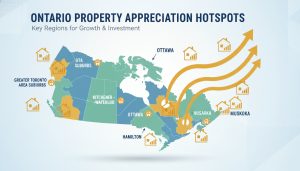Are pre-construction properties a good
investment?
Can pre-construction properties make you rich? Here’s the blunt answer.
Short answer: Yes — but only when you control the variables that drive resale value. Pre-construction properties can deliver strong returns, faster equity build, and better entry prices than resale units. They also carry holding costs, timing risk, and market risk. If you want a reliable outcome, you must evaluate market fundamentals, developer track record, deposit structure, and your exit plan.
Why this matters now
Pre-construction investment dominates conversations in major Canadian and U.S. cities. Developers keep delivering new inventory, interest rates and regulatory changes shift demand, and renters continue to drive urban markets. That mix creates both opportunity and danger. Smart investors treat pre-construction like a business, not a gamble.
How pre-construction affects investment and resale value
- Lower entry price in rising markets: Developers often price early units below future resale comparables. In hot markets, early buyers have seen meaningful appreciation by the time of closing.
- Forced savings and equity build: Holding deposits and staged payments lock in capital and can create instant equity if the market moves up before completion.
- Customization premiums: Upgrades and window placements can increase resale appeal and price.
- Timing risk and carrying costs: Delays, interest rate movements, and carrying costs can erode returns.
- Project and neighbourhood risk: Overbuilding, weak rental demand, or poor transit plans hurt resale value.
Data-driven perspective (what to measure)
- Projected appreciation range: In strong growth markets, early buyers can see 10–30% nominal appreciation at completion. In soft markets, returns can be zero or negative after costs.
- Rent growth: Check local rent growth over 3–5 years. Healthy markets show 3–6% annual rent growth.
- Absorption rate: How fast units are selling in the building and nearby projects. Faster absorption usually equals stronger resale potential.
- Vacancy rate: Sub-3% vacancy signals strong rental demand. Higher vacancy reduces rent power and resale appeal.
- Comparable resale price per sq.ft.: Use recently completed buildings within the immediate neighborhood as your benchmark.
Case study (illustrative example)
Example: Toronto-style condominium pre-construction play (composite, illustrative)
- Buy price (early release): $500,000
- Completion resale comps: $625,000
- Nominal appreciation: 25% before fees
- Typical costs: taxes, HST adjustments, assignment fee (if applicable), lawyer fees, mortgage interest during hold, and closing adjustments — these can eat 6–12% of the gain if you flip on assignment or 2–5% if you hold to completion and sell.
Outcome: A buyer who evaluates comparables, confirms developer track record, and has an exit plan realized a strong return. A buyer who ignored local supply pipelines and overleveraged faced delays, carrying costs, and lower or negative returns.
Common objections — straight answers
- “Pre-construction is too risky.” True if you ignore data. Mitigate risk by vetting developer history, reviewing local supply pipelines, and stress-testing your mortgage scenarios for a 12–24 month delay.
- “Delays kill profits.” Delays increase carrying costs. Plan for worst-case timing and ensure you can cover interim costs. Use conservative rent or sale price assumptions.
- “Quality is unknown.” Check past projects’ finishes, HOA complaints, and independent inspections of earlier buildings from the same developer.
- “What about interest rates?” Higher rates reduce buyer demand and can compress resale price. Focus on markets with strong fundamentals (jobs, population growth) that can withstand rate cycles.
Actionable checklist — what to do before you sign
- Verify the developer: Confirm at least two previously completed projects, inspect those units, and check occupancy and warranty claims.
- Analyze supply pipeline: Count new and planned units within 2 km. If pipeline growth outpaces demand, price pressure follows.
- Run comps: Compare price/sq.ft. of recently completed buildings and active resale listings.
- Stress-test financing: Model scenarios with a 12–24 month delay and 1–2% higher interest rate.
- Understand the deposit structure: Know the total deposit % and timing. Lower and staggered deposits reduce capital at risk.
- Plan your exit: Assignment flip, hold and rent, or hold to sell. Each has different costs and tax implications.
- Read the purchase agreement: Get a realtor and lawyer who know pre-construction clauses — assignment permissions, deposit protections, and occupancy date language.
Exit strategies to maximize resale value
- Assignment sale: Flip the contract before closing when demand is high. Quick profit but assignment clauses and fees matter.
- Hold to completion and sell: Lower transactional friction and often lower percentage costs than assignment flips.
- Rent and hold: Capture rent growth and allow the market to mature. This converts pre-construction into a longer-term investment property with potential tax advantages and steady cash flow.
- Upgrade strategically: Kitchen, flooring, and smart-home features can increase resale value more than expensive cosmetic choices.
How a local expert improves your odds
A top local realtor does three things you cannot easily replicate: access to private assignment demand, early insight into neighbourhood pipeline, and seller-buyer psychology at resale. That’s where working with an experienced local agent transforms risk into predictable outcomes.
If you want the highest probability of success, work with an agent who reviews developer history, runs detailed financial stress tests, and maps realistic exit strategies.
Ready to evaluate a pre-construction opportunity?
If you’re serious about using pre-construction to build equity and maximize resale value, get a clear, math-driven plan before you sign. I provide market-grade analysis, developer vetting, and sale/rent projections tailored to your goals.
Contact me for a no-nonsense analysis of any pre-construction project in the market. I’ll run the numbers, identify the risks, and outline the exact steps to protect your capital and maximize resale value.
Tony Sousa — Local Realtor and Investment Strategist
Email: tony@sousasells.ca
Phone: 416-477-2620
Website: https://www.sousasells.ca
Want the full pre-construction checklist and a project analysis template? Reach out and I’ll send it over.




















